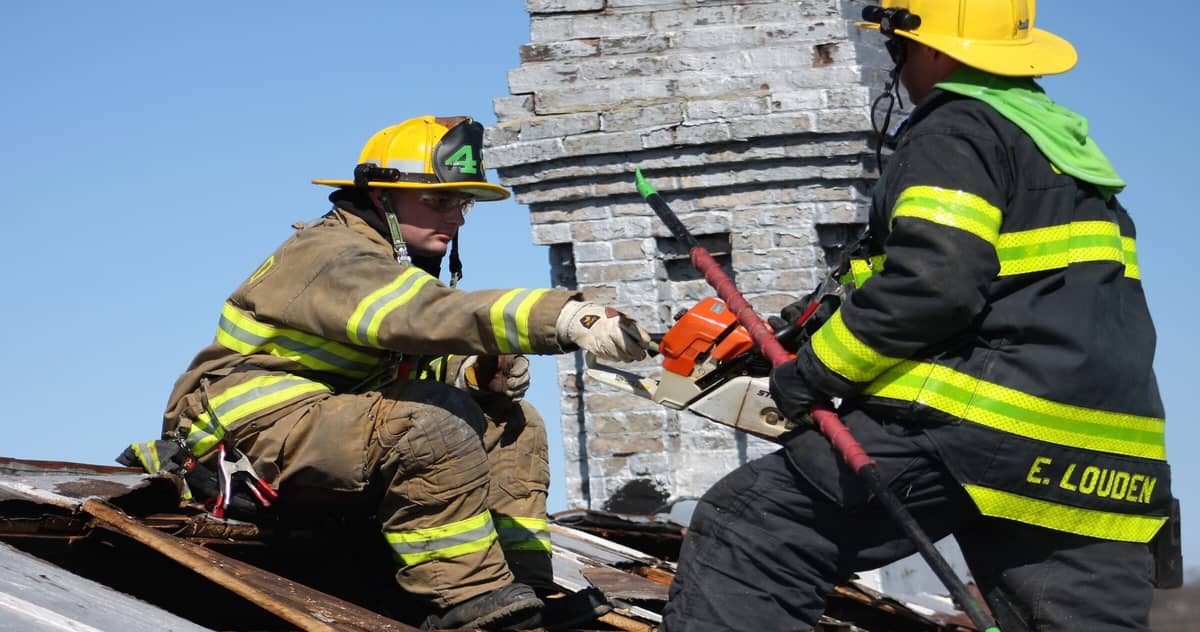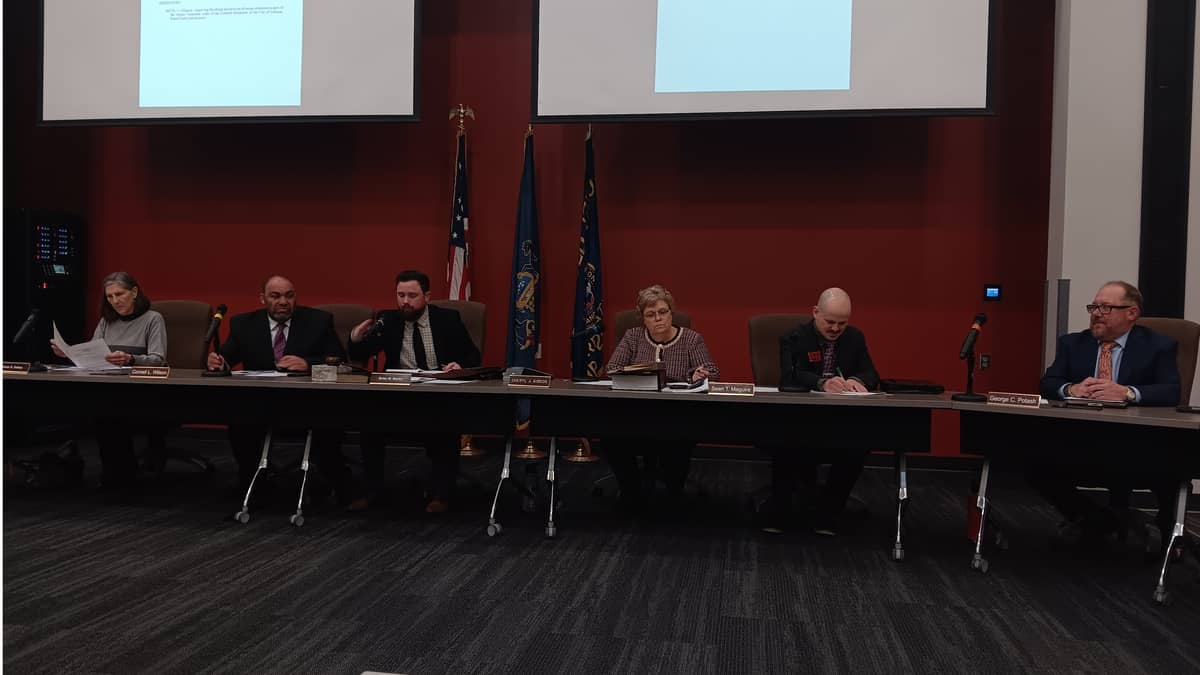An ounce of prevention is worth a pound of cure. If you fail to prepare, you prepare to fail.
When it comes to fire fighting in Lebanon County, training is no accident. Practice may not make perfect, but in the difficult and dangerous profession of firefighting, it does save lives.
Local firefighters take their training exercises very seriously, and for good reason. For them, training means preparedness.
“I don’t think that training’s degree of importance can be overstated,” said Duane Trautman, who’s been the City of Lebanon’s Fire Department commissioner for the last 11 years. “It’s a very dangerous job. You’ve got to know what you’re doing.”
Trautman said training reinforces and helps make familiar what firefighters already know.
Read More: Firefighting isn’t just what Duane Trautman does, it’s who he is
“I think everyone (firefighters) understands the importance of training,” Trautman added. “We couldn’t function the way we do without it. Everyone, to some degree, gets something from the training.”
Recently, members of the city of Lebanon Fire Department were joined by firefighters from various county departments for three days of rooftop training exercises conducted on a condemned four-story building owned by the city on north Eighth Street. A two-block portion of north Eighth Street was closed to traffic and ladders from two fire trucks provided about a dozen local firefighters access to the roof of the old building.

“It’s hugely important,” said Trautman. “We don’t get to do that type of training on a three- or four-story building very often. The city acquiring a building like that is quite rare. It was a great training opportunity. Everyone got a chance to climb the ladders, and you have to worry about wires. Some roofs are more difficult than others. Training is difficult in the winter, and we haven’t been able to do as much over the last year because of COVID-19.”
“You’ve got to keep your skills up,” continued Trautman. “There were a lot of guys up there who never did it before. Not everyone likes to get on a ladder. Some people aren’t the best with heights. But I appreciate people recognizing their limitations. Everyone who was up there got a whack at the roof, quite literally.”

Every fire is different. But depending upon circumstances and conditions, cutting a hole in the roof of a burning building can be a key element in fighting and containing a fire.
During the training exercise, the local firefighters took turns with chainsaws, cutting holes in the metal roof and exposing the ceiling’s rafters, which would allow air and eventually water to access the imaginary fire.
“Cutting a roof is just one of the functions of fighting a fire,” said Trautman. “It releases the smoke and heat from the building. When you punch a roof, smoke starts to come at you pretty good. But you’ve done a good thing. Opening a roof is vertical ventilation. It’s a very exacting practice in fighting a fire.”
“Opening a roof upsets the thermal balance,” Trautman continued. “It’s a very defined skill. Not everyone can do it. Some men like to be on the ground, and some like to be on the roof. Me personally, I’ve never been an inside guy. I’ve always gravitated towards the ladder truck.”

Local fire departments try to conduct training exercises about once a month, many of which are headed by the city of Lebanon’s department. Other types of firefighting exercises include water supply training, command operations, hose line training, vehicle rescue, driver training and hazmat training.
“I think everyone’s fairly well prepared,” said Trautman. “For some guys who are paid, it’s their job, it’s what they do. The activity comes with the turf. Some places (around the county) don’t have many fires and their calls are low. It’s very difficult getting men out during the day, or sometimes at all, anymore.”
“The numbers of volunteers, especially here in the city, have collapsed,” added Trautman. “Volunteerism in general has precipitously collapsed. It’s sad, and we’re not alone. I don’t understand why people don’t want to be a part of something.”
Of the 35 to 40 people who currently fight fires in the city of Lebanon, 23 are paid personnel. The volunteer firefighters who man local fire departments outside of the city number in the hundreds.
“You have to want to do it,” said Trautman. “People talk about recruiting or retention, but you have to know you want to do it. How many people want to be firemen when they’re young? You know at a young age. Firemen never grow up. Most of us have wanted to do it since our earliest memories.”
Read More: South Lebanon Twp. has firefighter shortage, starts incentive program for new volunteers
Typically, firefighters respond to about 90 to 110 fires of varying intensity each year, in the city alone.
“In degree, some may be kitchen fires,” said Trautman, a 53-year-old resident of Lebanon. “When it comes to burning structure fires, there are about two dozen a year. The most common causes are cooking and electrical, but there a good number of smoking-related fires too. I think I’d put smoking over electrical, but cooking is the number-one cause.”
As long as humans have congregated in communities, there have been fires. And as long as there have been humans fighting fires, there have been training exercises for firefighters.
“I think so,” said Trautman. “I’ve been at it for about 38 years now, and there’s always been training. It’s important. I think years ago, training was more formalized, it was more organized. It was more regional.”
“I would submit that in most cases, we used to train more,” Trautman added. “Those were the days of fire training schools. There used to be a fire training school at votech (now Lebanon County Career and Technology Center). I think that started in the (19)50s or 60s, and the Lebanon County fire chiefs were the primary sponsors. It was very beneficial training built around experience, before it disappeared about 15 to 20 years ago.”
That lack of formal, institutional, fire-fighting instruction makes the current local training exercises even more important. Moving forward, the effectiveness of local firefighting efforts will continue to hinge on training.
“We took advantage of a very unique opportunity,” said Trautman, of the rooftop exercises. “Some of these firemen from the townships don’t have three- or four-story buildings to work on. It was about gaining experience and gaining confidence. The functionality is very helpful when the chips are down and it’s time to work together.
“I hope it continues,” concluded Trautman. “Training is more about leadership, and leaders making sure their men are trained. I take it personally.”
If hands-on experience under fire is the greatest teacher, then training is a close second.
Questions about this story? Suggestions for a future LebTown article? Reach our newsroom using this contact form and we’ll do our best to get back to you.

Build the future of local news.
Cancel anytime.
Monthly Subscription
🌟 Annual Subscription
- Still no paywall!
- Fewer ads
- Exclusive events and emails
- All monthly benefits
- Most popular option
- Make a bigger impact
Already a member? Log in here to hide these messages
While other local news outlets are shrinking, LebTown is growing. Help us continue expanding our coverage of Lebanon County with a monthly or annual membership, or support our work with a one-time contribution. Every dollar goes directly toward local reporting. Cancel anytime.

























